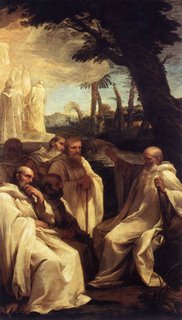
Pictured; The Vision of St. Romuald.
St. Romuald saw in a vision, like the prophet Jacob, his monks ascending a ladder to heaven. It brings to mind the classic practice of prayer, known as Lectio Divina; the monastic way of prayer our Holy Father Pope Benedict XVI hopes will have something of a renaissance in our time. It is perfectly compatible with the Teresian method of 'mental prayer' - when St. Teresa of Avila writes that she went to prayer with a book, I feel certain she understood this manner of prayer.
The Ladder of Monks, Guigo the Carthusian
On Lectio Divina:
ONE DAY while I was occupied with manual labor
Cum die quadam corporali manuum labore occupatus
I began to reflect on man’s spiritual work,
de spiritali hominis exercitio cogitare coepissem,
and suddenly four steps for the soul came into my reflection:
quatuor spiritales gradus animo cogitanti se subito obtulerunt
reading,
meditation,
prayer,
[and] contemplation
lectio
scilicet meditatio,
oratio
contemplatio
THIS is a ladder for monks
by means of which they are raised up from earth to heaven
qua de terra in coelum sublevantur,
It has [only a] few separate rungs, yet its length is immense and incredible:
gradibus quidem distincta paucis, immensae tamen et incredibilis magnitudinis,
for its lower part stands on the earth,
cujus extrema pars terrae innixa est,
while its higher [part] pierces the clouds and touches the secrets of heaven.
superior vero nubes penetrat et coelorum secreta rimatur
JUST as its rungs have various names and numbers,
Hi gradus sicut nominibus et numero sunt diversi
so also so they differ in order and merit;
ita ordine et merito sunt distincti;
and if one diligently searches out their properties and functions
quorum proprietates et officia,
- what each [rung] does in relation to us, how they differ from one another and how they are ranked-
quid singuli circa nos efficiant, quomodo inter se differant et praeemineant, si quis diligenter inspiciat,
he will regard whatever labor and study he expends as brief and simple compared with the great usefulness and sweetness [he gains].
quidquid laboris et studii impenderit in eis breve reputabit et facile prae utilitatis et dulcedinis magnitudine.
Reading is careful study of [Sacred] Scripture,
Est autem lectio sedula scriptuaru
with the soul’s [whole] attention:
cum animi intentione inspectio.
Meditation is the studious action of the mind
Meditatio est studiosa mentis actio,
to investigate hidden truth, led by one’s own reason.
occultae veritatis notitiam ductu propriae rationis investigans.
Prayer is the heart’s devoted attending to God,
Oratio est devota cordis in Deum intentio
so that evil may be removed
pro malis removendis
and good may be obtained.
vel bonis adipiscendis.
Contemplation is the mind suspended -somehow elevated above itself - in God
Contemplatio est mentis in Deum suspensae quaedam supra se elevatio
so that it tastes the joys of everlasting sweetness.
eternae dulcedinis gaudia degustans
HAVING assgned descriptions to each of the four rungs,
Assignatus ergo quatuor graduum descriptionibus,
we must see what their functions are in relation to us.
restat ut eorum circa nos officia videamus.
III THE FUNCTIONS of THESE AFOREMENTIONED RUNGS
III QUAE SUNT OFFICIA PRAEDICTORUM GRADUUM
FOR the sweetness of a blessed life:
Beatae vitae dulcedinem
Reading seeks;
lectio inquirit,
meditation finds;
meditatio invenit,
prayer asks;
oratio postulat,
contemplation tastes.
contemplatio degustat
Reading, so to speak, puts food solid in the mouth,
Lectio quasi solidum cibum ori apponit,
meditation chews and breaks it,
meditatio masticat et frangit
prayer attains its savor,
oratio saporem acquirit,
contemplation is itself the sweetness that rejoices and refreshes.
contemplatio est ipsa dulcedo quae jocundat et reficit.
Reading concerns the surface,
Lectio in cortice,
meditation concerns the depth
meditatio in adipe,
prayer concerns request for what is desired,
oratio in desiderii postulatione,
contemplation concerns delight in discovered sweetness.
contemplatio in adeptae dulcedinis delectatione. ( taken from
"The Ladder of Monks")










